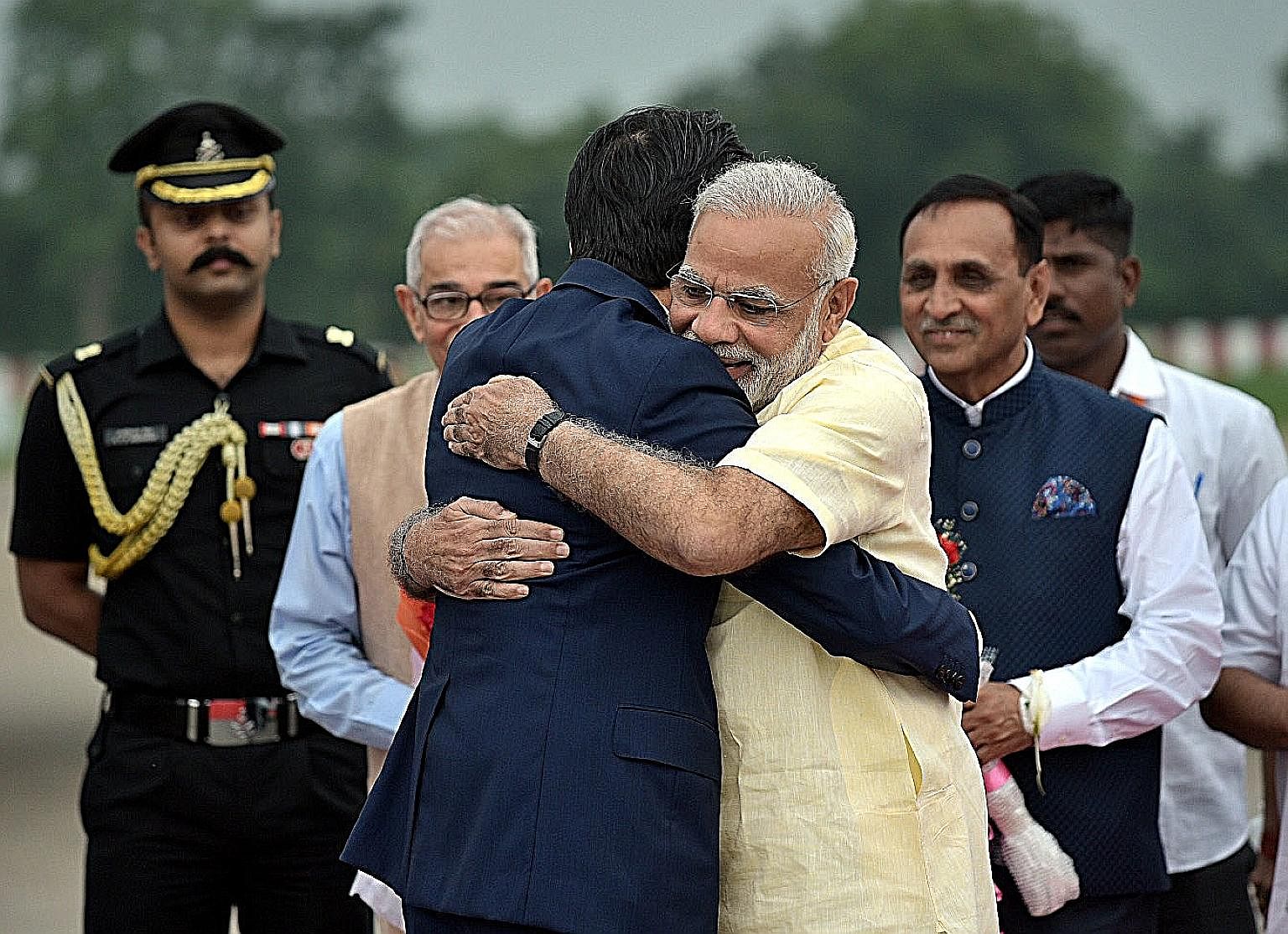In a palpable display of their "bromance" last week, Japanese Prime Minister Shinzo Abe and his Indian counterpart Narendra Modi exchanged a bear hug on the tarmac after Mr Abe touched down in Mr Modi's home state of Gujarat for their annual talks.
India and Japan, which share a mutual unease over China, have been great friends. Tokyo had this April even launched a parliamentary league to promote the ancient Indian discipline of yoga.
The two countries share a "growing convergence in political, economic and strategic interests", noted a joint statement after the summit.
Mr Abe called it a "historic day" that marked the start of a new chapter in bilateral ties as he kicked off the construction of India's first high-speed rail line. The 1.08 trillion rupee (S$22.6 billion) project taps on Japan's flagship shinkansen bullet train technology and will connect Gujarat's capital Ahmedabad to the financial hub of Mumbai.
He also committed his support for Mr Modi's flagship "Make In India" policy that relaxes caps on foreign investment so as to establish India as a manufacturing hub.
The two leaders, too, vowed to enhance defence links through surveillance and unmanned system technologies, and to look into holding joint field exercises between their armies next year. Also on the cards are reciprocal visits by their air forces, while the two navies already take part in the annual Exercise Malabar alongside the United States.
Dr Rupakjyoti Borah, a visiting research fellow at the Institute of South Asian Studies at National University of Singapore, told The Straits Times: "This is very significant as it represents a coming together of high-end Japanese technology with India's immense scientific and human resources."

Dr Borah, an expert on Indo-Japan ties who has worked at Japanese think-tanks, added: "The joint field exercises could represent a big development in their growing strategic ties."
The closer ties come amid simmering disquiet over Chinese assertiveness. India and China were recently engaged in a border stand-off, while Japan has its own maritime territorial row with China.
Tellingly, tucked into their 60-point statement were oblique references to China, which has a Belt and Road Initiative (BRI) to build infrastructure to connect Asia, Europe and Africa, and the China-led Asian Infrastructure Investment Bank.
Mr Abe has said Japan was "ready to extend cooperation" to the BRI, but with the caveat that projects must be economically viable and financed by debt that can be repaid, while India snubbed China's watershed Belt and Road Forum in May.
In the statement, the two leaders stressed the importance of ensuring the "development and use of connectivity infrastructure in an open, transparent and non-exclusive manner based on international standards and responsible debt financing practices, while ensuring respect for sovereignty and territorial integrity, the rule of law, and the environment".
They also shared their commitment to "tackle excess capacity in steel", urging the "removal of market-distorting subsidies", in another veiled reference to China.
At last year's summit, the two nations came together to form the "Asia-Africa Growth Corridor", seen as their answer to China's BRI. Dr Borah said it "could very well represent a different model of infrastructure development".
Japan is the largest foreign investor in India's infrastructure market and this involvement would continue to accelerate, according to a report by BMI Research last week.
It said: "India has a massive infrastructure deficit with planned projects spanning urban transit and sewerage systems to nationwide electricity transmission and highway networks, all of which will generate contracts that Japanese companies can take advantage of."
There is much potential for the two nations to cooperate in infrastructure projects in neighbouring Nepal and Bangladesh, the report added, "partly as a way to balance increasing Chinese investment and influence in the region".

